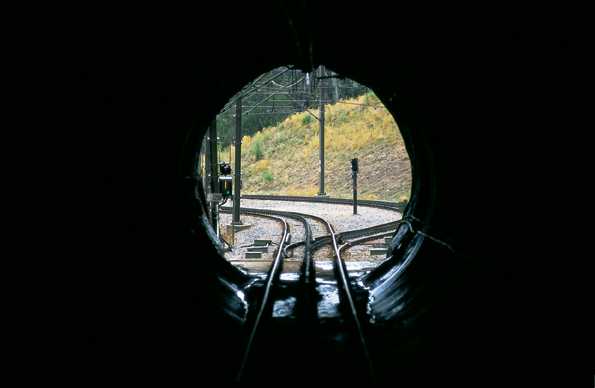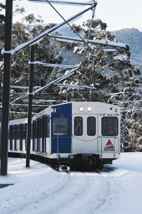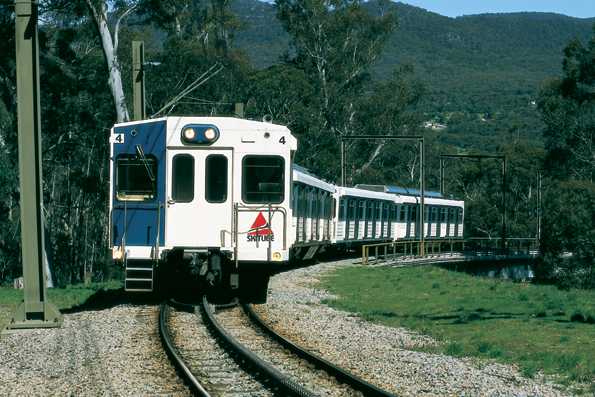
| Perisher Blue Skitube | |
 |
WHAT IS A RACK RAIL SYSTEM? |
The Skitube is a Swiss designed, primarily Australian built electric powered cog / rack driven railway system, operating 18 kms south-west of Jindabyne within the Kosciuszko National Park - New South Wales' largest national park and Australia's greatest alpine reserve - in Australia's Snowy Mountains. It provides access between the Alpine Way and Perisher Valley by way of a tunnel through the Ramshead Range to the Perisher Blue Ski Resort, stopping at the underground station in Perisher Valley. It then proceeds onwards to the resort of Blue Cow Mountain via another tunnel through the Perisher Range.
Primarily, the Skitube was designed as a winter based access system to improve entry to the Perisher skifields Until then these fields were served by a single road of limited capacity that was, and still is, often adversely affected by snow and ice conditions during the winter months. It was also deemed to be the most efficient and environmental acceptable alternative available. When it was decided to go ahead with the development of Blue Cow Mountain in 1984, Skitube was the most practical option for providing access to the resort and so Skitube was extended from Perisher to Blue Cow Mountain.
WHAT IS A RACK RAIL SYSTEM?
The cog / rack system is used where grades are too steep for normal wheel traction adhesion lines. In a cog / rack system cogs mounted beneath the powered rail cars mesh into a rack of teeth set between the wheel tracks. As the cogs revolve, they pull the train forward and can thus cope with considerably steeper gradients than can wheel traction driven systems. Downhill, the rack system is used for braking. As the Skitube travels downhill the braking system generates electricity back into the internal power grid which assists the trains travelling uphill. The majority of the technology used in the building of Skitube was imported from Switzerland, as the Swiss are world leaders in cog / rack technology.
Skitube uses a rack system invented by a Swiss engineer, Roman Abt, and first used in the Harz Mountains in central Germany in 1885.
SAFETY CONTROL TECHNOLOGY
In Australia, the alpine diurnal fluctuations of temperature can be as great as 25'c. Skitube features a high level of safety control technology built into the train and railway.
| Some of these include - | |
 |
|
Persisher Blue has continued to improve many safety features of the Skitube, including improvement to the signalling system, upgrading the SCADA system for train control and fire protection.
Skitube Operations staff consist of 11 train drivers and 4 Controllers, together with 16 Concourse staff who ensure a safe and punctual rail service.
The operation staff ensures a smooth flow of guest on and off all trains as well as check tickets and help guest with luggage and information.
A maintenance team of 11 people maintains the trains and tracks. Two track Inspectors who in the wee small hours of the night ensure the track is right for the next day. Two fitters maintain all mechanical components on the trains and associated plant. Six electricians look after everything from high voltage supply, which power the trains through to the electronic components, which control the trains and track.
All these staff ensures an efficient operation 24 hours per day during the winter season.
BASIC DATA
| PRINCIPAL
OWNERS Perisher Blue Pty Ltd. The Skitube was constructed by the former owners being the joint venture partners of Kumagai (NSW) Pty Ltd and Transfield Corporate Pty Ltd. Originally these partners were joined with Bilston Welding Engineers Pty Ltd who together formed the Perisher Skitube Joint Venture. This changed to the current ownership in March 1995. |
POWER SUPPLY 150Ov DC overhead electrical. Each car set has 4 x 31Okw motors supplying a total of 1650 horsepower. |
| CONSTRUCTION TIME: October 1984 - March 1988 |
MOVEMENT OF PEOPLE Currently this is 4,500 people per hour in total. |
| TUNNEL CONSTRUCTION: Bilston tunnel was constructed using a 5.5 metre diameter tunnel boring machine, while the Blue Cow tunnel was constructed by the traditional drill and blast method. |
SPEED Uphill speed - 40 kilometres per hour Downhill speed - 21 kilometres per hour |
| DEPTH Maximum - 550 metres underground Minimum - 4 metres underground |
TRAVEL TIME Bullocks Flat to Perisher Valley - 10 minutes Perisher Valley to Blue Cow Mountain - 5 minutes |
| LENGTH OF RAIL Underground - 6.3 kilometres Above ground - 2.2 kilometres Total - 8.5 kilometres |
CARRIAGE Length - 16.8 metres Width - 3.8 metres Capacity - 225 passengers |

TUNNEL SPECIFICATIONS:
| VERTICAL RISE Bullocks Flat to Perisher - 590 metres Perisher Valley to Blue Cow Mountain - 165 metres Total - 755 metres |
RAIL GAUGE: Standard (1435 millimetres) |
| DIAMETER: 5.0 - 5.5 metres |
BILSTON TUNNEL: 3300 metres length |
| GRADIENT: 12.5% maximum |
BLUE COW TUNNEL: 2600 metres length |
Warm thanks to Gregory Dower for article and pictures
This page was last modified on January 18, 2002